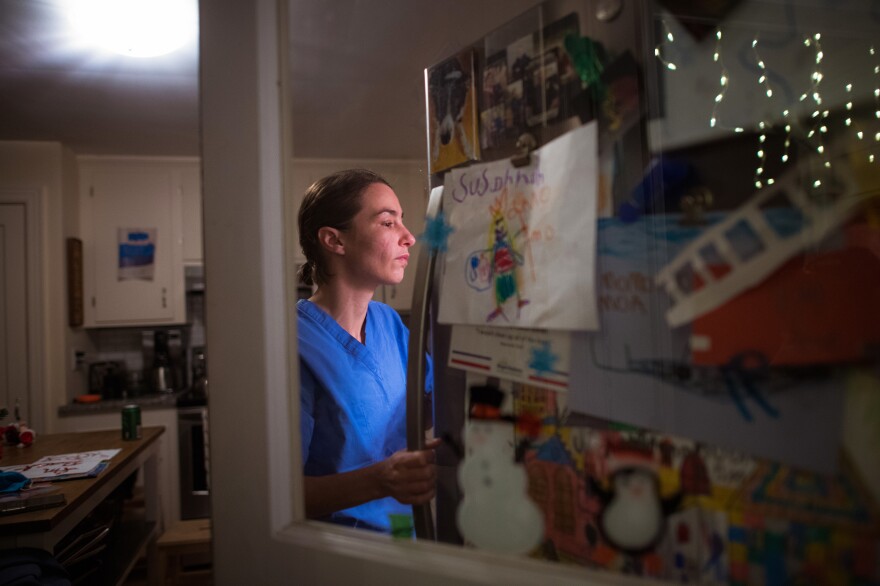The coronavirus surge has hit especially hard in the nation's smallest state. Rhode Island now averages about 87 new COVID-19 cases per 100,000 people — by far the highest in New England, according to data from the Centers for Disease Control and Prevention.
Bars and gyms are closed. And two field hospitals opened this week to care for an overflow of COVID patients. But extra hospital beds only solve one part of the equation.
Dr. Heather Rybasack-Smith knows the other part. On Tuesday night, the emergency medicine physician worked her first shift at the Rhode Island Convention Center in downtown Providence, now a field hospital.
"You put on your gown and your gloves and your mask...and your face shield,'' she said, from her car on the drive home, "and then you sort of open these doors and you walk into this giant space that feels almost like a cathedral..."
Inside the sprawling 100,000-square foot building, light glows from giant windows and vaulted ceilings dwarf its occupants. Hospitals tend to be noisy places; even more so emergency departments where Rybasack-Smith usually works. "It's almost quiet when you walk through,'' she said. "Like you can hear your footsteps on the cement floor as you go along the corridors."
Doctors and nurses in scrubs have replaced conventioneers carrying glossy conference packets, name tags dangling from their necks. "On either side" of the convention center's main event space, she said, "there's just patient bed after patient after patient bed."
Hundreds of beds. Only about a dozen of the beds were occupied. But the facility had just opened.

The convention center houses the largest of Rhode Island's two field hospitals. The other 353-bed facility is in a converted bank call center in Cranston. The field hospitals were built in the spring at a cost of $26.9 million but weren't used until now. They are designed to care for COVID patients who are not critically ill, providing the same level of care they would receive at a regular hospital.
"We have oxygen valves at every bed with regulators just like we would in the hospital,'' said Cathy E. Duquette, chief nursing executive at Lifespan, which is operating the field hospital at the convention center. But field hospitals require more than beds and equipment; they need staff.
"My biggest worry,'' Dr. Selim Suner said, "is, you know, will the number of infections continue to rise at this high rate?"
Suner is director of disaster medicine and emergency preparedness at Rhode Island Hospital. He runs the 600-bed field hospital in Providence. Suner said they have enough staff for about 50 patients. "But once we get beyond 100,'' he said, "staffing would be a significant issue."
Significant because of the national shortage of nursing staff. Suner said they've been able to fly in additional nurses from other states. But as the virus surges around the country, those nursing staff are becoming harder to find.
Rybasack-Smith, the emergency medicine doctor, is also worried. "If you could just picture all those empty beds you see on TV full of sick patients...that's overwhelming,'' she said. "We really have to do what we can to make that not happen and not ever reach that place."
If hospitals in Rhode Island can't find enough staff they will shift to what are called crisis standards of care, as happened during the spike in COVID-19 cases last spring in New York. Each nurse will then be assigned to care for more patients. Medical care will be triaged. In Rhode Island, health care providers say their best hope for preventing that from happening is for residents to obey the state's public health orders — and help curb the virus' spread.
Copyright 2020 The Public's Radio


